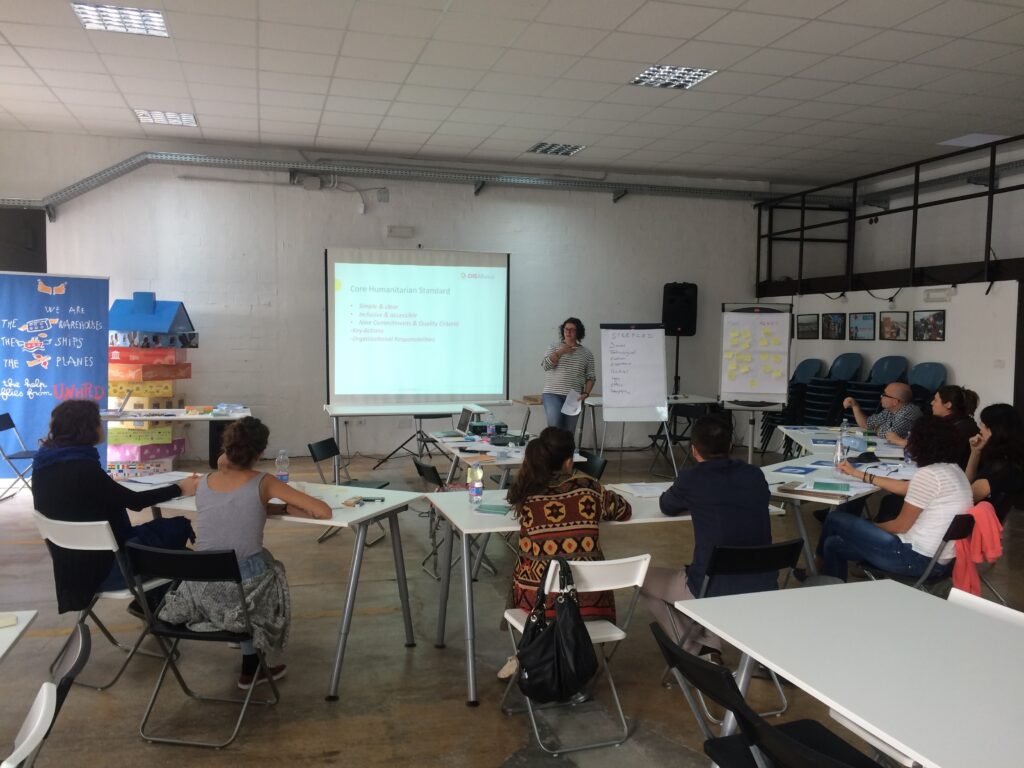Between the 15th and the 17th of December, the cycle of workshops on WORKING IN EMERGENCIES for Master HOPE – Master in Humanitarian Operations in Emergencies, Managing Projects, People Administration & Logistic in the Field – Edition June 2017, was held in Madrid, at the Social Change School headquarters, led by Diego Battistessa (Lecturer and Researcher at the Carlos III University of Madrid) and Elisa Paz and Elspeth Chapman (from Plan International Spain). Furthermore, there was also a moment for the fellow’s to meet Humanitarian Actors: Leok Peters, Director of Human Surge, and Valeria Vilardo from Plan International Spain.
 The first day was dedicated to an initial approach to “Conflict Management”, with Diego Battistessa, who focused on the cooperative way as a means to face the conflict, highlighting the importance of creative thinking.
The first day was dedicated to an initial approach to “Conflict Management”, with Diego Battistessa, who focused on the cooperative way as a means to face the conflict, highlighting the importance of creative thinking.
Aftewards, the students were able to meet two professionals from the Humanitarian Field: Leok Peters, Director of Human Surge, and Valeria Vilardo from Plan International Spain. This was a moment dedicated to a more personal contact with those organisations, their values and mission, to have a better understanding of the field. When asked about professional profiles by the students, Loek Peter highlighted the importance of languages in the humanitarian field, and the constant and current need of Arabic and French speakers. Furthermore, Valeria Vilardo stressed that to be specialised in a specific skill is the way to enter in the humanitarian and development fields. The meeting with the humanitarian actors was very important for the students to understand a little bit more about the market and requested profiles.
The second day was dedicated to “Introduction to Quality & Accountability – People Management & Leadership”, with Elisa Paz and Elspeth Chapman from Plan International Spain. A first moment was dedicated to address the current most pressing humanitarian crisis and different concepts of crisis. Then, the lecturers emphasised the importance of Gender in conflicts and the fellows engaged in the discussion and shared their thoughts on this issue.
 The second part of the day was dedicated to communication in humanitarian disasters as well as to stress management in emergencies. Then, the fellows did a role play of a meeting, in which they had to apply the tools and knowledge they had just assessed.
The second part of the day was dedicated to communication in humanitarian disasters as well as to stress management in emergencies. Then, the fellows did a role play of a meeting, in which they had to apply the tools and knowledge they had just assessed.
On Sunday, after a first moment of Question & Answers with the lecturers, the first part of the session was dedicated to career assessment, in which the lecturers shared their own professional experience and were open to answer to questions from the students. The second part of the morning was dedicated to the Needs assessment, and its importance in the drafting of a good project.
The objective achieved in this series of workshops was to develop the ability to analyze, set and solve problems in complex situations, the capacity of planning and recognize priority even in emergency situations, as well as the skills to communicate effectively in pressing environments, understanding the cultural influence on the relation, through a practical use of concepts and tools in simulations and exercises.
CARLA VERMÜE, HOPE Student: “It was very interesting because the lecturers brought in experiences from the field, with real examples”.
Photo source: Susana Ferreira, Master HOPE Coordinator and Career Development Officer


